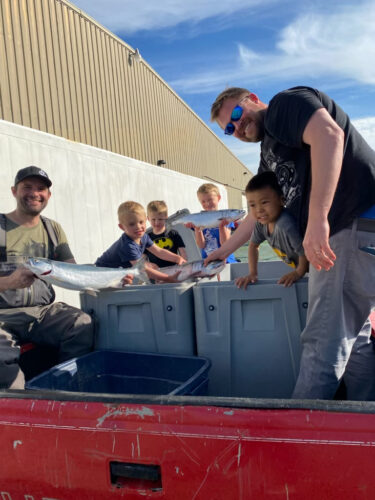
Dillingham Residents Encouraged To Share Sockeye Harvests With Communities Struggling To Catch Salmon
The following press release is courtesy of the Alaska Longline Fisherman’s Association and partners:


Dillingham-area residents invited to share their sockeye salmon with Alaska communities experiencing local salmon shortages
Dillingham, AK – Starting Tuesday June 20th, Dillingham-area residents can share their subsistence-caught sockeye salmon with Alaska communities experiencing low salmon returns, including communities in the Yukon and Chignik regions. The salmon collections are being coordinated through the Alaska Longline Fishermen’s Association’s (ALFA) Seafood Distribution Network, which includes partners from around the state working to build a more equitable and resilient local food system in Alaska.
The project’s organizers will collect salmon donations at Kanakanak Beach and Dillingham Boat Harbor. People interested in contributing their subsistence-caught salmon should check with project organizers for updates on salmon drop-off sites and locations; updates will be posted on the Alaska Longline Fishermen’s Association Facebook page, or people can contact local coordinator Jenny Bennis, 907-843-2436. Project organizers are asking people to only bring whole, high quality sockeye salmon that people would be comfortable putting their name on. After the fish is inspected it will be frozen whole and shipped in the coming weeks to communities in the Lower Yukon and Chigniks.
“It is heartbreaking to see salmon fisheries closed for the fourth straight year in Western Alaska where salmon is so central to local culture, tradition, and community. While this summer’s salmon collection in Dillingham won’t be able to fill the hole that those fishery closures have created, we hope that it can help ease some of the short-term strain and start to build a more long-term network of sharing between communities experiencing seafood abundance and those struggling with decline,” said Linda Behnken, Executive Director Alaska Longline Fishermen’s Association. “We are grateful for our local partners– Northline Seafoods, Grant Aviation, and Bristol Bay Native Association– who make this project possible.”
The Dillingham salmon collection is being coordinated through a team of volunteers, organizations, and businesses, including the Alaska Longline Fishermen’s Association, Alaska Sustainable Fisheries Trust, Northline Seafoods, Grant Aviation, and Bristol Bay Native Association.
“Bristol Bay Native Association is proud to support this project that will help ensure our neighbors in the Yukon and Chigniks are able to put up salmon despite the decline of their local salmon runs. We are fortunate to have the abundance we do in Bristol Bay and are glad to have this opportunity to share our salmon since sharing is what subsistence is all about,” said Gayla Hoseth, Director of Natural Resources for the Bristol Bay Native Association.
“It’s a difficult time for our communities, and especially our elders, as we face yet another summer without being able to catch, prepare, preserve and put away salmon as our main staple food supply. While nothing can replace being able to harvest our own fish, we are so grateful for the outpouring of support from our fellow Alaskans and the opportunity to continue with our culture and traditional practices, including sharing that knowledge with our children and grandchildren. Knowing that other Alaskans care and are willing to share what they have means a lot,” said Sven Paukan from St. Mary’s along the lower Yukon River.
The Seafood Distribution Network emerged through ALFA’s Seafood Donation Program, which was started in March 2020 in response to COVID-19 and its impacts on local fisheries and families. Since then, ALFA’s Seafood Donation Program has provided more than 645,000 donated Alaska seafood meals to families experiencing food insecurity in Alaska and the Pacific Northwest. With funding from the USDA, ALFA is currently undergoing a Regional Food System Partnership planning process in which it will develop a more long-term plan for the Seafood Distribution Network and its future seafood distribution efforts.



